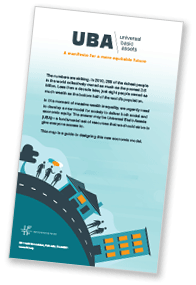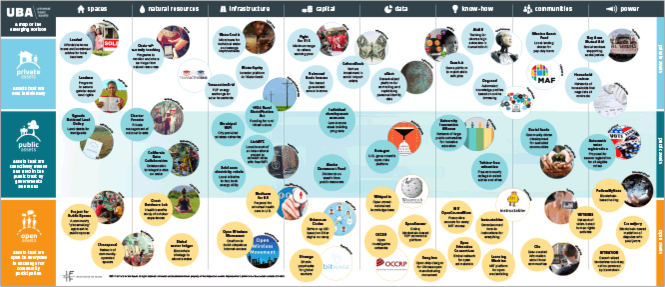Universal Basic Assets: A Manifesto

Universal Basic Assets
A manifesto for a more equitable future
In 2010, 288 of the richest people in the world collectively owned as much wealth as the poorest 3.5 billion people on the planet. Last year, according to a recent study by Oxfam International, just eight people owned as much wealth as the bottom half of the world’s population.  Throughout modern history, we’ve had to continuously navigate the dilemma of wealth concentration versus wealth distribution. On one hand, we must aggregate capital in order to make necessary investments and scale up economic activities in pursuit of growth. On the other, social cohesion and a functioning democracy depend on a more equitable distribution of economic prosperity. Today the equilibrium between these two goals is missing not only in the United States, but also in many developing economies simultaneously witnessing relatively high levels of growth and large income inequalities.
Throughout modern history, we’ve had to continuously navigate the dilemma of wealth concentration versus wealth distribution. On one hand, we must aggregate capital in order to make necessary investments and scale up economic activities in pursuit of growth. On the other, social cohesion and a functioning democracy depend on a more equitable distribution of economic prosperity. Today the equilibrium between these two goals is missing not only in the United States, but also in many developing economies simultaneously witnessing relatively high levels of growth and large income inequalities.
To regain balance and enable sustainable livelihoods for large swaths of the population, the Institute for the Future (IFTF) proposes a framework called Universal Basic Assets (UBA), which identifies a fundamental set of resources every person needs access to, from financial security and housing to healthcare and education.
In the UBA framework and manifesto, we focus on three broad classes of assets: Private assets include money, land, and housing. Public assets refer to infrastructure and services like education, health, and public utilities. Lastly, open assets are a growing category of mostly digital assets that are communally created and open to everyone, from Wikipedia and open education resources to scientific knowledge, artificial intelligence tools, and much more.
IFTF’s Universal Basic Assets framework and manifesto do not advocate collectivizing or seizing and distributing resources. Rather, they are a call to action to collaboratively identify the key assets people will need today and in the future in order to lead sustainable livelihoods as individuals, households, and wider communities. UBA offers actionable tools for designing policies and mechanisms for widening access to such resources.
We need to restore equilibrium in our economy, and the time to act is now.
Acknowledgments
IFTF developed the UBA framework as part of our multi-year initiative on Workable Futures, a deep exploration of how technologies are likely to re-shape the nature of work and jobs. In 2017, IFTF convened a UBA roundtable that brought together economists, technologists, finance experts, futurists, and social innovators to share current efforts to create distributive economic models. Their generous input, combined with IFTF’s own research, informed the creation of the UBA roadmap and manifesto.
CONTRIBUTORS:
Yomi Adedeji, Softcom • Stacy Bare, Sierra Club Outdoors • Kathleen Berroth, Omidyar Network • Erik Bordeleau, Economic Space Agency • Dick Bryan, University of Sydney • Rishi Chopra, Wadhwani Foundation • John Clippinger, ID3 • Deborah Cullinan, Yerba Buena Center for the Arts • Penelope Douglas, Art Bank • Karen Edwards, Project Sapphire • Matthew Eshed, Impossible Labs • Vincent Egbe, The Kraft Heinz Company • Natalie Foster, Economic Security Project • Jose Garcia, Ford Foundation • Simone Giacomelli, Vulpem and ID3 • Benjamin Goertzel, Hanson Robotics • Mark Gomez, Leap Forward Project, Haas Institute for a Fair and Inclusive Society • Suzana Grego, Skoll Foundation • Louis Hyman, Cornell University • Taylor Jo Isenberg, Economic Security Project • Tito Jankowski, Impossible Labs • Kirti Kandade, Kanvz • Esko Kilpi, Esko Kilpi Company • Tom King, Organized Crime and Corruption Reporting Project • Pekko Koskinen, Economic Space Agency • Ruth Levine, William and Flora Hewlett Foundation • David Li, Shenzhen Open Innovation Lab • Vienna Looi, Economic Space Agency • Tess Posner, AI4All • TR Ramachandran, Kanvz • Nathan Schneider, University of Colorado, Boulder • Stephanie Seguino, University of Vermont • Alpen Sheth, Economic Space Agency • Danny Spitzberg, Peak Agency • Drew Sullivan, Organized Crime and Corruption Reporting Project • Thuong Tan, Tekes • David Thigpen, University of California, Berkeley • Sarah Treuhaft, PolicyLink • Akseli Virtanen, Economic Space Agency • Vinitha Watson, Zoo Labs • Lawrence Wilkinson, Heminge and Condell • Mike Zuckerman, [freespace]
Download the Manifesto
Media
- Ozy, "Universal Basic Assets: A Smarter Fix Than Universal Basic Income," November 30, 2018
- Commonwealth Club of California podcast: "Marina Gorbis: Universal Basic Assets—A Better Society for All?"
- Fast Company, "Universal Basic Assets Could Be the Foundation to Build an Equitable Society," April 16, 2018
- Quartz, "To fix income inequality, we need more than UBI—we need Universal Basic Assets," October 11, 2017
- Japan Today, "Money, assets are tightly controlled in the hands of the few; it's time to revisit that philosophy," October 6, 2017
- Arab News, “Why the world needs a new economic model,” September 23, 2017
- WORK2017, “The Platform Economy Will Restructure Work,” August 17, 2017
- The Basic Income Podcast, “Universal Basic Assets, featuring Marina Gorbis,” July 18, 2017
- Futurism, “There Is a Solution to Our Broken Economy Besides Universal Basic Income,” May 10, 2017
- Boing Boing, “Eight people own the same wealth as 3.6 billion other people,” April 5, 2017
- Medium, “There Could Be a Real Solution to Our Broken Economy. It’s Called ‘Universal Basic Assets,’” April 4, 2017
Contacts
For more information or to become a sponsor, contact:
Cindy Baskin | cbaskin@iftf.org
For media inquiries, contact:
Jean Hagan | jhagan@iftf.org | 650-233-9551





